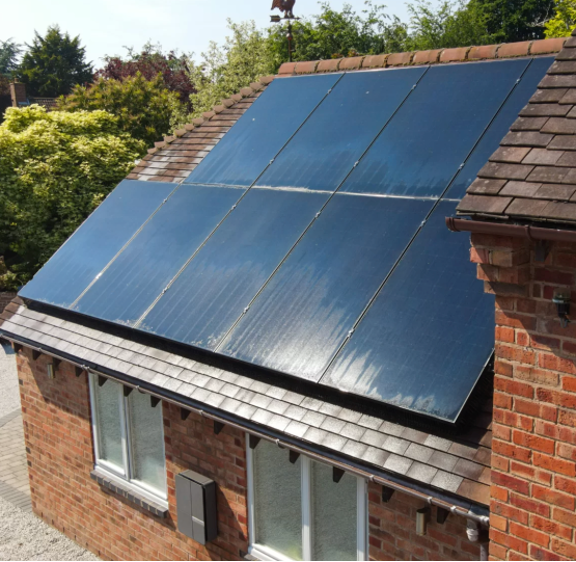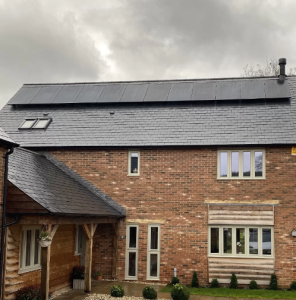Understanding Solar Panel Output Winter Vs Summer UK: Seasonal Differences
Solar panel output in the UK experiences seasonal variations due to changes in daylight hours and weather conditions. So, do solar panels work better in summer or winter? During summer months, longer days and increased sunlight result in higher energy production, whereas winter brings shorter days and less intense sunlight, sometimes leading to reduced output.
Understanding these patterns is essential for homeowners to effectively manage their energy consumption and expectations.
In the UK, solar panels in summer usually operate near their maximum capacity, benefiting from up to 16 hours of daylight on sunnier days. However, due to less daylight, and less sun solar panels in winter may see a reduction in output simply due to the shorter days. Despite this, typically we install storage batteries with our Solar PV Systems – this means that even on darker days, or throughout the winter you can maximise savings through buying cheaper energy from the grid during off peak periods.
How Well Do Solar Panels Work in the Winter?
So, how well do solar panels work in the winter? In the UK, solar panels continue to generate electricity even on short, cloudy days. While output is lower compared to summer, panels still capture daylight and convert it into energy. Importantly, cooler temperatures actually help solar panels operate more efficiently than in very hot weather.
However, the main reason for reduced winter performance is fewer daylight hours and less intense sunlight. For example, the UK can see up to 16 daylight hours in June but only around 8 in December. This naturally means lower production in the winter months.
To maximise your savings, we often recommend pairing your solar system with battery storage. This allows you to store surplus energy on brighter days and use it later, cutting grid reliance and keeping bills lower throughout the colder season.
In short, solar panels still work effectively in the winter — they simply generate less power due to shorter days. With the right setup, you’ll continue to benefit from lower bills and reliable, renewable energy all year round.
Factors Influencing Solar Power Output Comparison
Several factors contribute to the difference in solar power output between winter and summer. The primary elements include the number of daylight hours, sun angle, and weather conditions.
In summer, the sun is higher in the sky, providing more direct sunlight, while in winter, the sun’s lower position results in less efficient energy capture. Additionally, solar panel efficiency in the UK can be affected by temperature. Interestingly, solar panels operate more efficiently in cooler temperatures, which can partially offset the reduced sunlight in winter.
However, the overall decrease in sunlight hours and intensity during winter months still leads to lower energy production compared to summer.
How we improve your Solar System’s Efficiency Year-Round
To maximise solar panel efficiency in the UK throughout the year, homeowners can implement several strategies.
The primary way to improve your year-round generation is through investing in battery storage, like the Tesla Powerwall 3.
Adding a battery to your solar panel setup means you can store the extra energy your panels produce during sunny days, especially in the summer, and use it later when there’s less sunlight, like in the winter. This helps you get the most out of your solar power all year long, while also cutting back on your need for energy from the grid. It makes your energy supply steadier and more reliable, even when the days are short and cloudy.
Taking energy efficiency a step further, smart tariffs like Octopus Energy’s ‘Intelligent Octopus Flux’ offer homeowners with solar panels and battery storage a savvy way to reduce bills and make the most of their setup.
This tariff provides a 21-hour off-peak window priced 10% below the standard variable rate, allowing batteries to charge when electricity is cheaper. During the 4–7 pm peak period, when demand and prices are higher, the system discharges stored energy to power the home or export back to the grid, maximising savings and earnings.
We appreciate that this may sound complex, but we’ll review the best tariff for you, when planning your installation.
Embracing Solar Energy for Sustainable Living
At Stratford Energy Solutions, we are committed to helping you harness the full potential of solar energy year-round. Our expert team offers tailored solutions to optimise your solar panel system for both winter and summer conditions.
Contact us today to learn how we can assist you in achieving sustainable and efficient energy use in your home.
Understanding the seasonal variations in solar panel output in the UK is crucial for effective energy management.
While summer months offer higher energy production, implementing strategic measures can significantly enhance performance during winter. By adopting these practices, homeowners can ensure a more consistent and efficient use of solar energy throughout the year.
Ready to take the next step?
Request your free, no-obligation solar quote today and see how much you could save while making a smart, sustainable investment for your home. Our certified experts are here to guide you every step of the way.
Get a Quote Online: Request a free quote
Call Us: 01789 262 411
Email: pv@stratfordenergy.co.uk

